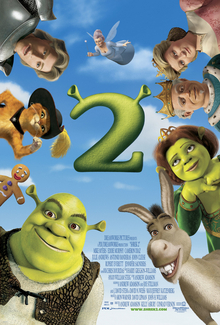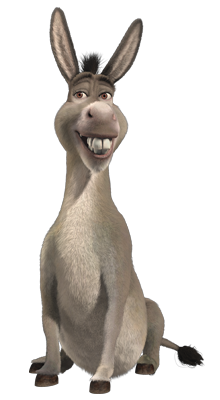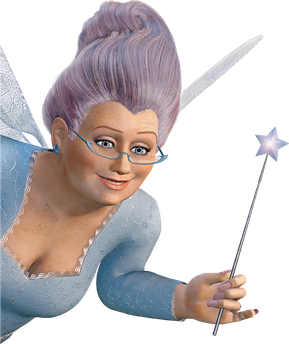A fairy godmother is a fairy who acts as a mentor or guardian for a young person.
Contents
Fairy godmother may also refer to:
A fairy godmother is a fairy who acts as a mentor or guardian for a young person.
Fairy godmother may also refer to:
A godmother is a female godparent in the Christian tradition; she is present at the christening of the child and promises to see that the child is raised to be a Christian. She may also offer mentorship and/or claim legal guardianship of the child as her own if needed due to circumstances.

Shrek 2 is a 2004 American animated fantasy comedy film loosely based on the 1990 children's picture book Shrek! by William Steig. Directed by Andrew Adamson, Kelly Asbury, and Conrad Vernon from a screenplay by Adamson, Joe Stillman, and the writing team of J. David Stem and David N. Weiss, it is the sequel to Shrek (2001) and the second installment in the Shrek film series. The film stars Mike Myers, Eddie Murphy and Cameron Diaz, who reprise their respective voice roles of Shrek, Donkey, and Princess Fiona. They are joined by new characters voiced by Antonio Banderas, Julie Andrews, John Cleese, Rupert Everett, and Jennifer Saunders. Shrek 2 takes place following the events of the first film, with Shrek and Donkey meeting Fiona's parents as the zealous Fairy Godmother, who wants Fiona to marry her son Prince Charming, plots to destroy Shrek and Fiona's marriage. Shrek and Donkey team up with a sword-wielding cat named Puss in Boots to foil her plans.

In fairy tales, a fairy godmother is a fairy with magical powers who acts as a mentor or parent to someone, in the role that an actual godparent was expected to play in many societies. In Perrault's "Cinderella", he concludes the tale with the moral that no personal advantages will suffice without proper connections.

Prince Charming is a fairy tale stock character who comes to the rescue of a damsel in distress and must engage in a quest to liberate her from an evil spell. This classification suits most heroes of a number of traditional folk tales, including "Snow White", "Sleeping Beauty", "Rapunzel" and "Cinderella", even if in the original story they were given another name, or no name at all.

Donkey is a fictional character created by William Steig and adapted by DreamWorks Animation for the Shrek franchise. He is voiced primarily by Eddie Murphy. Donkey is an anthropomorphic donkey and his appearance is modeled after a miniature donkey named Perry. He is depicted with grey fur, brown eyes, and a black mane. In the franchise, he is the sidekick and best friend of Shrek, husband to Dragon, and father to a litter of Dronkeys (Dragon-Donkeys). As the series' comic relief character, Donkey is well-regarded by critics for his wit, wisdom, and humor.
Rapunzel is a character in a fairy tale recorded by the Brothers Grimm.

Princess Fiona is a fictional character in DreamWorks' Shrek franchise. One of the film series' main characters, Fiona first appears in Shrek (2001) as a beautiful princess cursed to transform into an ogre at night. She is initially determined to break the enchantment by kissing a prince, only to meet and fall in love with Shrek, an ogre, instead. The character's origins and relationships with other characters are further explored in subsequent films: she introduces her new husband, Shrek, to her parents in Shrek 2 (2004); becomes a mother by Shrek the Third (2007); and is an empowered warrior in Shrek Forever After (2010), much of which takes place in an alternate reality in which Fiona and Shrek never meet.
"Bibbidi-Bobbidi-Boo" is a novelty song, written in 1948 by Al Hoffman, Mack David, and Jerry Livingston. Introduced in the 1950 film Cinderella, and performed by actress Verna Felton, the song is about the Fairy Godmother transforming an orange pumpkin into a white carriage, four brown mice into white horses, a gray horse into a white-haired coachman and a brown dog into a white-haired footman. The song was nominated for the Academy Award for Best Original Song in 1951 but lost out to "Mona Lisa" from Captain Carey, U.S.A. Disney used the song once again in their 2015 remake of Cinderella which starred Lily James in the leading role. The song was performed by Helena Bonham Carter, who plays Fairy Godmother, and was the final song of the movie, playing with the end credits. Bonham Carter's version can also be found as the 30th song on the original movie soundtrack.
Snow White is a popular fairy tale.
A donkey is a four-legged animal, closely related to the horse.

Shrek is a fictional ogre character created by American author William Steig. Shrek is the protagonist of the book of the same name, a series of films by DreamWorks Animation, as well as a musical. The name "Shrek" is a romanization of the Yiddish word שרעק, or שרעקלעך, related to the German Schreck and meaning "fear" or "fright". In the films, Shrek was voiced by Mike Myers, and in the musical, he was played principally by Brian d'Arcy James.

The Fairy Godmother is the main antagonist of DreamWorks Animation's Shrek franchise, voiced by actress Jennifer Saunders. Introduced as the main antagonist of Shrek 2, the Fairy Godmother is the mother of Prince Charming, who Princess Fiona was originally intended to wed prior to meeting Shrek. Believing that ogres should not live happily ever after, she plots against newlyweds Shrek and Fiona's relationship, using her magic and potions in an attempt to trick Fiona into falling in love with her son. Fairy Godmother is loosely based on the stock fairy godmother character in fairy tales, specifically "Cinderella" and "Sleeping Beauty", serving as a parody of the common trope.

Shrek is an American media franchise of DreamWorks Animation, loosely based on William Steig's 1990 picture book Shrek! The series primarily focuses on Shrek, a bad-tempered but good-hearted ogre, who begrudgingly accepts a quest to rescue a princess, resulting in him finding friends and going on many subsequent adventures in a fairy tale world. It includes four animated films: Shrek (2001), Shrek 2 (2004), Shrek the Third (2007), and Shrek Forever After (2010), with a fifth film, Shrek 5, currently in production for a 2026 release. A short 4-D film, Shrek 4-D, which originally was a theme park ride, was released in 2003. Two television specials, the Christmas television special Shrek the Halls (2007) and the Halloween television special Scared Shrekless (2010), have also been produced. Two spin-off films were made centered around the character Puss in Boots: 2011's Puss in Boots and its sequel, 2022's The Last Wish. Additionally, a stage musical adaptation was made and premiered at Broadway for more than a year (2008–2010).
A gingerbread man is a biscuit or cookie made of gingerbread, in human shape.
Prince Charming is the stock character of fairy tales.
A fairy tale is a story featuring folkloric characters.
A talking donkey is a type of talking animal; in this case, the animal is a donkey. Examples include:

Shrek is a 2001 American animated fantasy comedy film loosely based on the 1990 children's picture book of the same name by William Steig. Directed by Andrew Adamson and Vicky Jenson and written by Ted Elliott, Terry Rossio, Joe Stillman, and Roger S. H. Schulman, it is the first installment in the Shrek film series. The film stars Mike Myers, Eddie Murphy, Cameron Diaz, and John Lithgow. In the film, an embittered ogre named Shrek (Myers) finds his home in the swamp overrun by fairy tale creatures banished by the obsessive ruler Lord Farquaad (Lithgow). With the help of Donkey (Murphy), Shrek makes a pact with Farquaad to rescue Princess Fiona (Diaz) in exchange for regaining control of his swamp.
Lord Maximus Farquaad is the main antagonist of the 2001 animated feature film Shrek, as well as Shrek 4-D and the musical. He is voiced by John Lithgow. He does not appear in William Steig's original picture book of the same name. He is famous for his magnanimous statement "Some of you may die, but it's a sacrifice I am willing to make".